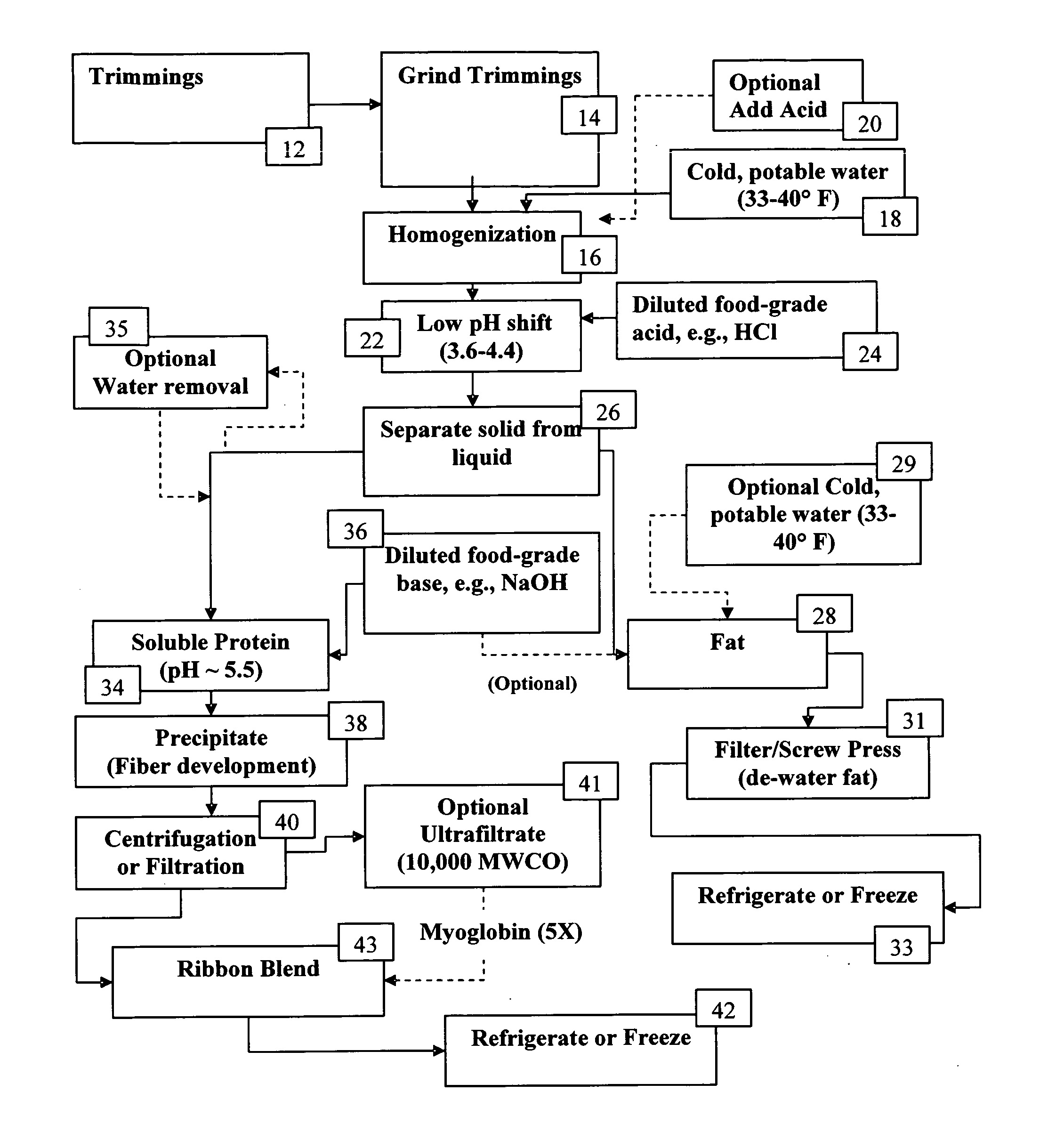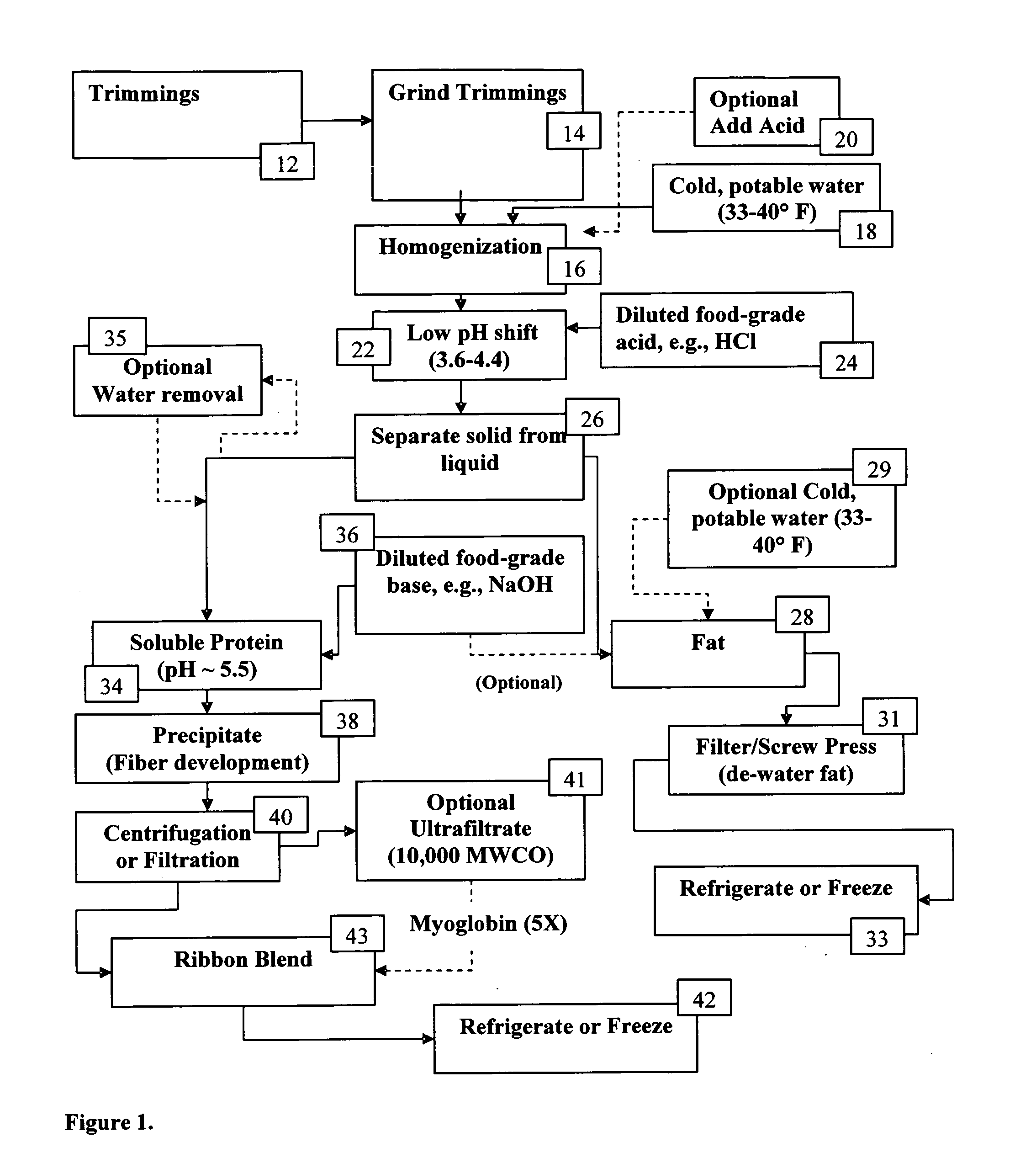Process for isolating a protein composition and a fat composition from meat trimmings
- Summary
- Abstract
- Description
- Claims
- Application Information
AI Technical Summary
Benefits of technology
Problems solved by technology
Method used
Image
Examples
example i
[0032]A test was performed to examine the degree of hydrolysis comparing the amount of non-protein nitrogen compared to the amount of protein nitrogen. Results are shown in Table 1 for Lean Cold Processed Pork & Beef made using hydrochloric acid and sodium hydroxide, and unprocessed, raw pork and beef muscle by the process of FIG. 1.
TABLE 1Non Protein Protein NitrogenNitrogenRatio Sample #(NPN) (%)(PN)NPN / PNRaw Beef 0.262.47 0.11Lean Cold1.48Processed BeefRaw Pork 0.473.20 0.15Lean Cold 0.051.62 0.03Processed Pork
[0033]When the ratio of NPN / PN was measured, was obtained an average of 0.03 for Lean Cold Processed Pork and 0.15 for raw pork muscle. The average for Lean Cold Processed Beef was 0.62 for “highly hydrolyzed” proteins. Values for the Lean Cold Processed Meat proteins indicate very little hydrolysis has occurred, especially since the value is only approximately 20% for pork and <9% for beef of the value found for comparable whole raw meats, which appears to have not u...
example 2
[0036]From the perspective of microbial reduction, the process for manufacturing refolded protein of this invention has an advantage to the process for lean finely textured meat because in the process of this invention, is processed under cold conditions and the proteins will not solubilize, hence the process will not work without a certain amount of food-grade acid, which inhibits microbes. In other words, in order to obtain specified yields for the product, certain benchmarks in pH, and these pH levels are what inhibits microbes are reached. Thus, there are inherent controls in the processing of the products of this invention that enhance product safety. Analytic tests demonstrate the process effectively produces a 1-3 log reduction of the microbes as compared to the starting meat.
TABLE 4Microbiological Results for PorkStartingPrecipitatedStartingPrecipitatedStartingPrecipitatedPorkPorkPorkPorkPorkPorkAnalyte#1#1#2#2#3#3Aerobic Plate>250000 / g2900 / g200000 / g4200 / g120000 / g2800 / gCount...
example 3
[0037]This example illustrates that recovery of protein from meat trimmings must be effected at a pH of 3.6 or above in order to recover a protein product from satisfactory color. This example also illustrates that initially obtaining protein having an unsatisfactory color cannot be reversibly converted to a protein product having a satisfactory color.
[0038]The results obtained in Table 6 were obtained with 40 g samples of ground beef. To each sample was added 160 ml of cold tap water (40° F.). The samples were then homogenized to a particle size of about 100 microns. The pH of each sample was adjusted with 1M food grade hydrochloric acid to a pH set forth in Table 6. Each sample was centrifuged for 8 minutes at 5000 g at 4° C. and then filtered through glass wool to separate solid fat from protein liquid composition. 40 ml of each liquid portion was poured into a container on top of white paper. Each sample was then measured twice with each sample with a Minolta colorimeter that me...
PUM
 Login to View More
Login to View More Abstract
Description
Claims
Application Information
 Login to View More
Login to View More - R&D
- Intellectual Property
- Life Sciences
- Materials
- Tech Scout
- Unparalleled Data Quality
- Higher Quality Content
- 60% Fewer Hallucinations
Browse by: Latest US Patents, China's latest patents, Technical Efficacy Thesaurus, Application Domain, Technology Topic, Popular Technical Reports.
© 2025 PatSnap. All rights reserved.Legal|Privacy policy|Modern Slavery Act Transparency Statement|Sitemap|About US| Contact US: help@patsnap.com


